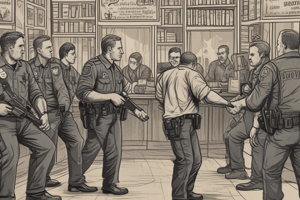Podcast
Questions and Answers
What is the defining characteristic of a low-scale conflict?
What is the defining characteristic of a low-scale conflict?
- Use of violence
- Involving groups of people
- Minor consequences, short duration (correct)
- Long duration, difficult to resolve
Which term refers to the worsening of a low-scale conflict to become a high-scale conflict?
Which term refers to the worsening of a low-scale conflict to become a high-scale conflict?
- De-escalation
- Escalation (correct)
- Intra-state war
- Inter-state war
What is the primary feature of a high-scale conflict?
What is the primary feature of a high-scale conflict?
- Serious consequences, long duration (correct)
- Minor consequences, short duration
- Involving individuals
- Intra-state conflict
What defines a state of armed conflict typically involving two or more groups with aggressive actions?
What defines a state of armed conflict typically involving two or more groups with aggressive actions?
What are intra-state wars also known as?
What are intra-state wars also known as?
What type of conflict usually involves individuals and has minor consequences?
What type of conflict usually involves individuals and has minor consequences?
Which term refers to armed conflicts occurring within the boundaries of a single country or state?
Which term refers to armed conflicts occurring within the boundaries of a single country or state?
When a low-scale conflict is handled badly, what may cause it to worsen and become a high-scale conflict?
When a low-scale conflict is handled badly, what may cause it to worsen and become a high-scale conflict?
What defines a state of armed conflict typically involving two or more groups with aggressive actions?
What defines a state of armed conflict typically involving two or more groups with aggressive actions?
What type of conflict usually involves direct military engagement between the armed forces or governments of participating nations?
What type of conflict usually involves direct military engagement between the armed forces or governments of participating nations?
Flashcards are hidden until you start studying
Study Notes
Characteristics of Conflicts
- A low-scale conflict is defined by its limited scope, duration, and impact.
- Escalation refers to the worsening of a low-scale conflict to become a high-scale conflict.
High-Scale Conflicts
- The primary feature of a high-scale conflict is its large-scale destruction, significant loss of life, and widespread impact.
Armed Conflicts
- A state of armed conflict typically involves two or more groups with aggressive actions, such as civil wars, rebellions, or insurgencies.
- Intra-state wars are also known as civil wars or internal conflicts.
Conflict Types
- Inter-state wars typically involve direct military engagement between the armed forces or governments of participating nations.
- Intra-state conflicts, or civil wars, occur within the boundaries of a single country or state.
- Individual conflicts usually involve individuals and have minor consequences.
Conflict Escalation
- When a low-scale conflict is handled badly, it may cause it to worsen and become a high-scale conflict, leading to a state of armed conflict typically involving two or more groups with aggressive actions.
Studying That Suits You
Use AI to generate personalized quizzes and flashcards to suit your learning preferences.



